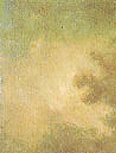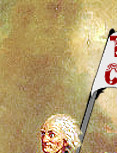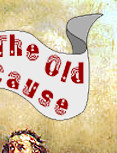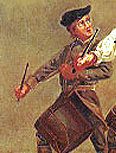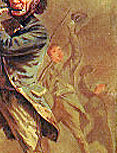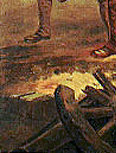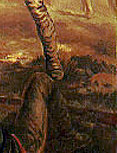|
|
|
September 7, 1999 SYDNEY SMITH: A POUND OF MOTHERWIT AND AN OUNCE OF CLERGYSydney Smith (1771- 1845) was an Anglican minister chiefly remembered, not for his contributions to ecclesiastical management or theology, much less orthodoxy, but for his humorous commentary on the folly he saw around him. Many of his contemporaries thought him the greatest satirist and all-around English wit since Swift. Lord Lansdowne called him "an odd mixture of Punch and Cato." Smith is perhaps most often quoted these days for his views on war and especially from his letter to Lady Grey (of which more, soon enough). He was an adherent of the Whig party and his ideas on war, peace, and other questions flowed from his commitment to the classical liberal values to be found, a good part of the time, in that party. Later in life, Smith concluded that no political party was the faithful guardian of the people's liberties. As his literary biographer, Hesketh Pearson1, remarks, the main problem in reconstructing Smith's sayings (much less his world outlook) is that he lacked a Boswell to follow him around and write down his every word. His friends and acquaintances were generally too overcome with laughter to reconstruct exactly what he had said. We are thus left with Smith's published writings, letters, and the testimony of those souls who could remember what he said. At a time when ecclesiastical preferment depended on never offending anyone important and not expressing views likely to be controversial, Sydney Smith spoke his mind, delighting many and alarming others, and thereby assured that he would never be a bishop in the Church of England. As a result, he moved around from parish to parish, with each church "living" a little better than the last, and became, in the end, financially comfortable. (Having well-placed friends among the Whigs did that much for him, at least.) WHIG REFORMISMIn 1802, Smith, Francis Jeffrey, and Henry Brougham founded the Edinburgh Review as a vehicle for reformist Whig ideas which we would call "liberal" today, although the term was not then in use. This was a time of political repression in Britain and the mildest call for change brought forth accusations of Jacobinism and sedition. The wars with revolutionary France had not run their course and many new restrictions on speech, assembly, and other rights of Englishmen had come into being during these wars (alongside some older ones). The review was serious business and Smith contributed to it for twenty-five years. He had great fun tackling serious questions. Once, he seemed to weigh carefully a proposed society for the suppression of vice, and he concluded – after a hilarious summary of various cruelties favored by the gentry – that it would better be called "a Society for suppressing the vices of persons whose income does not exceed L500 per annum." As for being fair to his fellow writers, he quipped, "I never read a book before reviewing it; it prejudices a man so." Smith believed in religious toleration, including Catholic emancipation. This did not keep him from making fun of Methodists, Scottish Presbyterians, and Dissenters, when he thought them wrong or amusing, which was quite often. In the course of a discussion of Methodist missionary work, he asked if it was actually wise to teach foreigners the gospel? "If the Bible is universally diffused in Hindostan, what must be the astonishment of the natives to find that we are forbidden to rob, murder, and steal; we who, in fifty years, have extended our empire from a few acres about Madras, over the whole peninsula, and sixty millions of people, and exemplified in our public conduct every crime of which human nature is capable." It would actually be better to tell those natives that Machiavelli "is our prophet." Smith was a great critic of the cruel punishments still employed in England. He was a vocal opponent of the Game Laws. He believed that English policy itself was the chief cause of Irish alienation from English rule. This made Ireland the permanent scene of danger of foreign invasion, from which England, so far, had been providentially saved by favorable winds. This made English policy in Ireland "anemocracy," or government by breezes. WAR, PEACE, AND FOREIGN POLICYIntroducing a collection of his reviews, Smith wrote that "There is more of misery inflicted upon mankind by one year of war than by all the civil peculations and oppressions of a century. Yet it is a state into which the mass of mankind rush with the greatest avidity, hailing official murderers, in scarlet, gold and cocks' feathers, as the greatest and most glorious of human creatures. It is the business of every wise and good man to set himself against this passion for military glory, which really seems to be the most fruitful source of human misery." In one of his reviews Smith had what might be a premonition of several contemporary American journals, when he wrote that: "We are always glad to bring the scenery of war before the eyes of those men who sit at home with full stomachs and safe bodies, and are always ready with vote and clamour to drive their country into a state of warfare with every nation of the world." In another, he has some advice for the young American Republic: "We can inform Jonathan what are the inevitable consequences of being too fond of glory: – TAXES upon every article which enters into the mouth, or covers the back, or is placed under the foot – taxes upon every thing which it is pleasant to see, hear, feel, smell, or taste – taxes upon warmth, light, and locomotion" and so on, until, finally, the citizen's "virtues are handed down to posterity on taxed marble; and he is then gathered to his fathers – to be taxed no more." Given the apparent, if irrational, popularity of war, Smith thought it "at all times a better speculation to make ploughshares into swords than swords into ploughshares." He would not have thought much of the current American fashion of armed intervention to spread "democracy." Widespread agitation for intervention in Spain in 1823 brought forth this response from him: "I would rather the nascent liberties of Spain were extinguished than go to war to defend them.... Why are the English to be the sole vindicators of the human race?" This proposed intervention called forth his most famous utterance on war – his letter to Lady Grey: "For God's sake, do not drag me into another war! I am worn down and worn out with crusading and defending Europe and protecting mankind; I must think a little of myself. I am sorry for the Spaniards – I am sorry for the Greeks – I deplore the fate of the Jews; the people of the Sandwich Islands are groaning under the most detestable tyranny; Baghdad is oppressed – I do not like the present state of the Delta – Tibet is not comfortable. Am I to fight for all these people? Am I to be champion of the Decalogue and to be eternally raising fleets and armies to make all men good and happy? We have just done saving Europe, and I am afraid the consequence will be that we shall cut each other's throats. No war, dear Lady Grey! no eloquence; but apathy, selfishness, common sense, arithmetic!" The alert reader will have noticed that Baghdad is still "oppressed" and that Tibet is still "not comfortable." And there are still those who wish to raise fleets, armies, and air forces "to make all men good and happy." We were offered a mild form of that program in the early 1820s ourselves – saving Greece, saving our Latin American neighbors, etc. – and on our side of the water John Randolph of Roanoke made much the same response as Sydney Smith did on his. TODAY'S MOTTOIn a poorly received sermon on religious tolerance, Sydney Smith said that "to do wrong, and gain nothing by it, is surely to add folly to fault." This could easily be the motto of recent US foreign policy of, say, the last hundred years. Perhaps those words could be carved in stone over the entrance of some public building in the World Capital, formerly Washington City. Perhaps someone would read them. Meanwhile, I think it is our duty to stir up as much "apathy, selfishness, common sense, arithmetic" as possible. [1] See generally Hesketh Pearson, The Smith of Smiths, being The Life, Wit and Humour of Sydney Smith (London: Harper & Brothers, 1934). Joseph R. Stromberg has been writing for libertarian publications since 1973, including The Individualist, Reason, the Journal of Libertarian Studies, Libertarian Review, and the Agorist Quarterly, and is completing a set of essays on America's wars. He is a part-time lecturer in History at the college level. You can read his recent essay, "The Cold War," on the Ludwig von Mises Institute Website. His column, "The Old Cause," appears each Tuesday on Antiwar.com.
Please Support Antiwar.comA contribution of $20 or more gets you a copy of Justin Raimondo's Into the Bosnian Quagmire: The Case Against US Intervention in the Balkans, a 60-page booklet packed with the kind of intellectual ammunition you need to fight the lies being put out by this administration and its allies in Congress. Send contributions to Antiwar.com or
Contribute Via our Secure Server |
